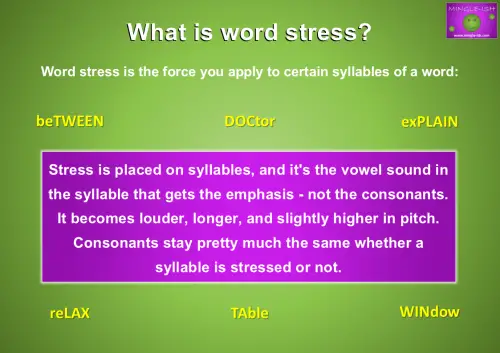Contents
When you speak English, how you say something can be just as important as what you say. That’s where word and sentence stress comes in! Learning which words to stress and when can help you sound more natural, more confident, and much easier to understand. Whether you’re new to English or just want to polish your pronunciation, this page will guide you through the basics in a simple, stress-free way (pun intended!).
What is Word Stress?
So, you’ve all heard of stress, right? I’m not talking about the emotional/mental strain caused by our hectic modern lives. I’m talking about word and sentence stress. No? I’ll tell you… stress is when you emphasise different parts of a word. In English, not every syllable is said equally. In longer words, we usually stress one syllable more than the others. This is called word stress.
For example:
beTWEEN, DOCtor, TAble,
The capital letters show the part of the word that gets more emphasis – it’s a bit louder, longer, or clearer.
Why does this matter? If you put the stress on the wrong syllable, people might not understand you — or it could sound like a completely different word! As if pronunciation wasn’t hard enough without throwing ‘stress’ into the mix!
What is Sentence Stress?
Sentence stress is about which words you say more strongly in a sentence. In English, we don’t stress every word — just the important ones.
- We usually stress:
nouns, main verbs, adjectives, adverbs, question words - We usually don’t stress:
auxiliary verbs, articles, prepositions, conjunctions, pronouns
For example:
I WENT to the SHOP to buy some BREAD.
The stressed words give the meaning — the rest helps the grammar flow.
Why Stress Matters
Correct stress makes your English sound natural, smooth, and easy to follow. It helps with rhythm and intonation, and it’s key for listening too — knowing which words to expect makes it easier to understand fast speech.
Common Mistakes Learners Make
Even advanced learners sometimes get tripped up by stress patterns. Here are some of the most common mistakes — and how to fix them:
Stressing every word equally
Some learners speak English with a flat rhythm, stressing all words the same. But English is a stress-timed language, meaning some words are naturally emphasised more than others. This flat tone can make you sound robotic or harder to understand.
🔁 Fix it: Focus on stressing the content words (nouns, main verbs, adjectives, adverbs) and softening the function words (prepositions, articles, auxiliary verbs, etc.).
Example:
❌ I AM GOING TO THE SHOP NOW.
✅ I’m GOING to the SHOP now.
Putting the stress on the wrong syllable
Some learners speak English with a flat rhythm, stressing all words the same. But English is a stress-timed language, meaning some words are naturally emphasised more than others. This flat tone can make you sound robotic or harder to understand.
🔁 Fix it: Focus on stressing the content words (nouns, main verbs, adjectives, adverbs) and softening the function words (prepositions, articles, auxiliary verbs, etc.).
Example:
❌ I AM GOING TO THE SHOP NOW.
✅ I’m GOING to the SHOP now.
Ignoring weak forms
In natural spoken English, we often use weak forms for certain small words. These unstressed forms are reduced and sometimes hard to hear, but they’re essential for sounding fluent and understanding fast speech.
🔁 Fix it: Practise listening to and saying weak forms like to (tuh), for (fuh), and (n’), and of (uhv).
Example:
“I want to go” = I wanna go
“He’s kind of tired” = He’s kinduh tired
Over-pronouncing function words
Saying every little word clearly might seem helpful, but it actually makes your speech sound unnatural. Native speakers often glide over words like can, have, was, to, and the when they aren’t stressed.
🔁 Fix it: Focus on clarity for key words, not every word. Your listener will fill in the rest.
Example:
“I CAN swim” (stress “can” if it’s important)
“I can SWIM” (normally “can” is reduced)
Not adjusting stress to show meaning
Stress doesn’t just follow grammar rules — it can also change depending on what you want to emphasise. Learners often miss this more flexible use of stress to highlight what’s important.
🔁 Fix it: Try stressing different words in a sentence to shift the focus.
Example:
I didn’t say he stole the money. (It was someone else.)
I didn’t say he stole the money. (I didn’t say it.)
I didn’t say he stole the money. (Someone else did.)
It’s not that difficult once you get the hang of it. Don’t stress about stress, check out the videos below to help give you a better understanding.
It’s not that difficult once you get the hang of it. Don’t stress about stress, check out the videos below to help give you a better understanding.
If you found this helpful, have a browse through our other pages to keep building your grammar skills and confidence.

